Outlaw country is a subgenre of American country music created by a small group of iconoclastic artists active in the 1970s and early 1980s, known collectively as the outlaw movement, who fought for and won their creative freedom outside of the Nashville establishment that dictated the sound of most country music of the era. Willie Nelson, Waylon Jennings, Merle Haggard, Johnny Cash, Kris Kristofferson, Johnny Paycheck, and David Allan Coe were among the movement's most commercially successful members.

Highwayman is the first studio album released by country supergroup The Highwaymen, comprising Kris Kristofferson, Johnny Cash, Waylon Jennings and Willie Nelson. Highwayman, released on Columbia Records in 1985, was the group's first and most successful album.
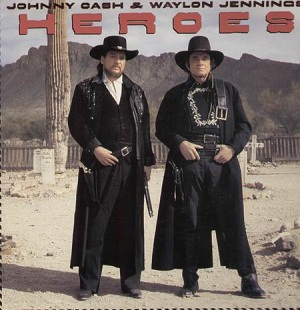
Heroes is a duet studio by American country music singers Johnny Cash and Waylon Jennings, released on Columbia Records in 1986.

Border Lord is the third album by Kris Kristofferson, released in 1972 on Monument Records.
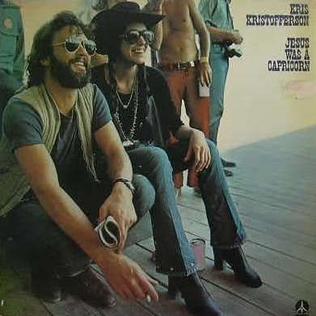
Jesus Was a Capricorn is the fourth album by Kris Kristofferson, released in 1972 on Monument Records. The album cover pictures Kristofferson and his soon-to-be wife Rita Coolidge. "Why Me" reached #1 on the Country singles charts.
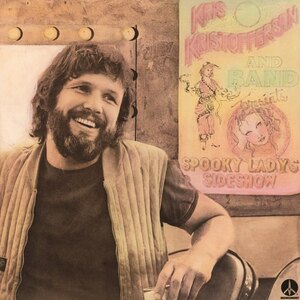
Spooky Lady's Sideshow is the fifth solo album by Kris Kristofferson, released in 1974 on Monument Records. It was preceded and followed by duet albums with his wife, Rita Coolidge. It was recorded shortly after Kristofferson's appearance in the movie Pat Garrett and Billy the Kid. The album mostly consists of songs about decline due to alcohol and drug abuse. That theme of decline proved to be (unintentionally) prophetic as this was Kristofferson's first album that failed to see commercial success on a large scale.

Who's to Bless and Who's to Blame is the sixth solo album by Kris Kristofferson, released in 1975 on Monument Records. Its title track is quoted in the Johnny Cash song "The Man Comes Around" from the 2002 album of the same name. The song "Stranger" was covered as a duet by Johnny Duncan and Janie Fricke, and their version reached #4 on the U.S. country chart in 1976.

Easter Island is the eighth solo album by Kris Kristofferson, released in 1978 on Monument.

Repossessed is an album by Kris Kristofferson, released on Mercury Records in 1986. It was Kristofferson's first full-length solo album since 1981's To the Bone, although the singer did collaborate with other artists in the meantime, most notably on Highwayman with Johnny Cash, Waylon Jennings and Willie Nelson.
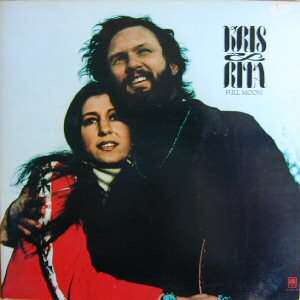
Full Moon is a duet album by Kris Kristofferson and Rita Coolidge, released in September 1973 on A&M Records. It is the first of three duet albums by the couple, who married weeks before the album's release, and arguably the best. Unlike Kristofferson solo albums, it features several covers.
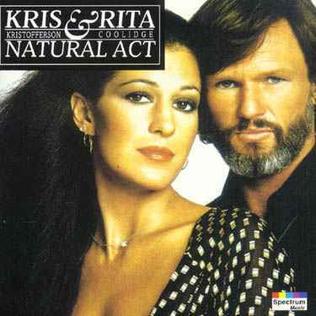
Natural Act is the third and final duet album by Kris Kristofferson and Rita Coolidge, released in 1978 on A&M Records. The couple would divorce the following year. The album was released while Coolidge's career was at a peak; her recent albums Anytime...Anywhere and Love Me Again had seen much commercial success. Natural Act is Kristofferson's only album to chart in the United Kingdom.
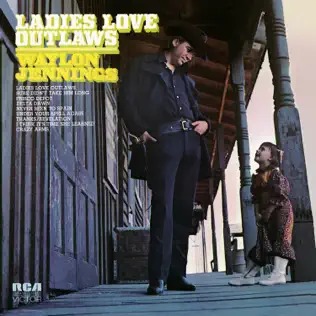
Ladies Love Outlaws is an album by American country music artist Waylon Jennings, released on RCA Nashville in 1972. Together with Jennings' previous album Good Hearted Woman, it marks his transition toward his Outlaw Country image and style. "Ladies Love Outlaws" coined the use of the term "Outlaw" to refer to the country music subgenre, which was developing at the time of its release.

This Time is a studio album by American country music artist Waylon Jennings, released on RCA Victor in 1974, at the peak of the outlaw country movement. It was produced by Jennings and Willie Nelson.

Dreaming My Dreams is the twenty-second studio album by American country music artist Waylon Jennings. The album was co-produced with Jack Clement and recorded at Glaser Sound Studios in Nashville, Tennessee, between February and July 1974.

Wanted! The Outlaws is a compilation album by Waylon Jennings, Willie Nelson, Jessi Colter, and Tompall Glaser, released by RCA Records in 1976. The album consists of previously released material with four new songs. Released to capitalize on the new outlaw country movement, Wanted! The Outlaws earned its place in music history by becoming the first country album to be platinum-certified, reaching sales of one million.

Waylon & Willie is a duet studio album by American singers Waylon Jennings and Willie Nelson, released by RCA Records in 1978. In the US, it stayed at #1 album on the country album charts for ten weeks and would spend a total of 126 weeks on the country charts.

Waylon Live is a live album by Waylon Jennings, released on RCA Victor in 1976.
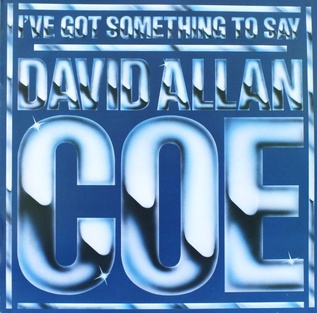
I've Got Something to Say is an album released by country musician David Allan Coe. It was released in 1980 on Columbia. Guy Clark, Bill Anderson, Dickey Betts, Kris Kristofferson, Larry Jon Wilson, and George Jones are all featured on this album.

The Willie Way is the 15th studio album by country singer Willie Nelson. This was also the last album of new material released by RCA Records before Nelson's departure for Atlantic Records and move to Austin, Texas.

Good Times is the eighth studio album by American country music singer Willie Nelson, released in 1968. Arrangements were by Anita Kerr, Bill Walker and Ray Stevens.



















